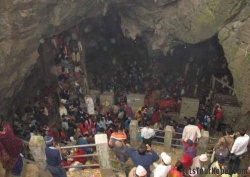Difference between revisions of "Maratika Cave"
| Line 1: | Line 1: | ||
[[File:Halesi.jpg|thumb|250px|]] | [[File:Halesi.jpg|thumb|250px|]] | ||
| − | '''Maratika Cave''' and Maratika Monastery (Maratika is also known as Haleshi or Halase, 27.19006°N 86.622391°ECoordinates: 27.19006°N 86.622391°E) are located in Khotang District in Nepal, circa 185 km south west of Mount Everest. It is a venerated site of pilgrimage associated with Mandarava, Padmasambhava and longevity. | + | '''[[Maratika Cave]]''' and [[Maratika]] [[Monastery]] ([[Maratika]] is also known as Haleshi or Halase, 27.19006°N 86.622391°ECoordinates: 27.19006°N 86.622391°E) are located in Khotang District in [[Nepal]], circa 185 km [[south west]] of {{Wiki|Mount Everest}}. It is a venerated site of [[pilgrimage]] associated with [[Mandarava]], [[Padmasambhava]] and longevity. |
| − | Mandarava and Padmasambhava realised a number of terma that had been elementally encoded as terma in Maratika Cave by Dakini Sangwa Yeshe, terma that number among the longevity teachings of Buddha Amitabha and given at the behest of Bodhisattva Avalokiteswara. At Maratika Cave, Mandarava and Padmasambhava attained the Vidyadhara of longevity or long life. | + | [[Mandarava]] and [[Padmasambhava]] realised a number of [[terma]] that had been elementally encoded as [[terma]] in [[Maratika Cave]] by [[Dakini]] Sangwa Yeshe, [[terma]] that number among the longevity [[teachings of Buddha]] [[Amitabha]] and given at the behest of [[Bodhisattva]] [[Avalokiteswara]]. At [[Maratika Cave]], [[Mandarava]] and [[Padmasambhava]] [[attained]] the [[Vidyadhara]] of longevity or long [[life]]. |
==Original sources== | ==Original sources== | ||
| − | According to current scholarship, the caves of Maratika are referred to in Himalayan literature from the 12th century. Kathang Zanglingma, a biography of Padmasambhava, a terma revealed and transmitted by Nyangrel Nyima Ozer, describes the original events which made the Maratika caves a sacred place for Vajrayana practitioners. | + | According to current {{Wiki|scholarship}}, the [[caves]] of [[Maratika]] are referred to in [[Himalayan]] {{Wiki|literature}} from the 12th century. Kathang [[Zanglingma]], a {{Wiki|biography}} of [[Padmasambhava]], a [[terma]] revealed and transmitted by Nyangrel [[Nyima]] Ozer, describes the original events which made the [[Maratika]] [[caves]] a [[sacred]] place for [[Vajrayana]] practitioners. |
| − | Haleshi Mahadeva or Maratika Cave- The famous natural cave in Khotang District, said to be the abode of Mahadeva while hiding away from the monster Bhasmasur. It is famous pilgrimage centre in east Nepal for both Hindus and Buddhist and is also nicknamed as 'the Pashupatinath of the east'. Huge religious fairs are observed here on Shivaratri and Bala Chaturdashi. | + | Haleshi [[Mahadeva]] or [[Maratika Cave]]- The famous natural {{Wiki|cave}} in Khotang District, said to be the abode of [[Mahadeva]] while hiding away from the monster Bhasmasur. It is famous [[pilgrimage]] centre in [[east]] [[Nepal]] for both [[Hindus]] and [[Buddhist]] and is also nicknamed as 'the Pashupatinath of the [[east]]'. Huge [[religious]] fairs are observed here on Shivaratri and [[Bala]] Chaturdashi. |
{{W}} | {{W}} | ||
[[Category:Padmasambhava]] | [[Category:Padmasambhava]] | ||
[[Category:Buddhist Pilgrimages]] | [[Category:Buddhist Pilgrimages]] | ||
Revision as of 16:16, 6 October 2015
Maratika Cave and Maratika Monastery (Maratika is also known as Haleshi or Halase, 27.19006°N 86.622391°ECoordinates: 27.19006°N 86.622391°E) are located in Khotang District in Nepal, circa 185 km south west of Mount Everest. It is a venerated site of pilgrimage associated with Mandarava, Padmasambhava and longevity.
Mandarava and Padmasambhava realised a number of terma that had been elementally encoded as terma in Maratika Cave by Dakini Sangwa Yeshe, terma that number among the longevity teachings of Buddha Amitabha and given at the behest of Bodhisattva Avalokiteswara. At Maratika Cave, Mandarava and Padmasambhava attained the Vidyadhara of longevity or long life.
Original sources
According to current scholarship, the caves of Maratika are referred to in Himalayan literature from the 12th century. Kathang Zanglingma, a biography of Padmasambhava, a terma revealed and transmitted by Nyangrel Nyima Ozer, describes the original events which made the Maratika caves a sacred place for Vajrayana practitioners.
Haleshi Mahadeva or Maratika Cave- The famous natural cave in Khotang District, said to be the abode of Mahadeva while hiding away from the monster Bhasmasur. It is famous pilgrimage centre in east Nepal for both Hindus and Buddhist and is also nicknamed as 'the Pashupatinath of the east'. Huge religious fairs are observed here on Shivaratri and Bala Chaturdashi.
